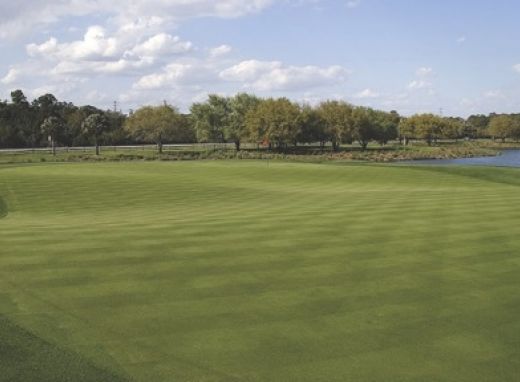At a Glance
Developed specifically for golf greens, TifEagle Bermudagrass consistently outperforms other super- and ultra-dwarf varieties when managed against recommended golf course management practices. It’s superior to most other varieties in rhizome production, low thatch production, color maintenance during cool temperatures, and low seedhead production.
Cultivation
Sprigging is preferred to sodding to start a uniform and healthy turf.
Mowing
Daily from 1/10 to 1/8 inches.
Development
Released by internationally recognized USDA/ARS plant geneticist Dr. Wayne Hanna, TifEagle is the third generation of Bermudagrass varieties developed exclusively for golf greens at the Coastal Plains Experiment Station in Tifton, Ga. As a USDA patented variety, TifEagle can only be sold as certified sod or sprigs and only by a licensed member of the TifEagle Growers Association. TifEagle also is available for international licensing through the International Turfgrass Genetic Assurance Program (ITGAP).
Breeder

Dr. Wayne Hanna
In his turfgrass breeding program at the University of Georgia, Dr. Wayne W. Hanna focuses on developing seed- and pollen-sterile, low-maintenance cultivars with drought and pest tolerance.
He has developed popular forage cultivars such as Tifleaf 2 and Tifleaf 3 pearl millet, Grazer annual rye grass, TifQuik bahia grass, and Mott dwarf elephant grass. He has also developed commercial turfgrass cultivars including Tifton 10, TifSport, TifEagle and TifGrand Bermuda grasses and TifBlair centipedegrass. More recently he has released purplish/red ornamental Pennisetum hybrids (Prince, Princess, Princess Caroline, Princess Molly, Vertigo, First Knight, Tift 11, Tift 15, Tift 26, Tift 40 and Tift 118) and an ornamental perennial peanut, Cowboy.
Dr. Hanna’s research currently focuses on producing seed- and pollen-sterile ornamental grass cultivars (Miscanthus spp., Lovegrass, Rubygrass, Little Blue Stem, Pennisetum alopecuroides, P. hohenackeri, and P. orientale) and on coneless/pollenless pine trees (loblolly and slash) as well as seedless cultivars of cold-tolerant citrus (tangerine, lemon and grapefruit), a variegated Chinaberry tree, and pomegranate.
Dr. Hanna was an Assistant Professor at the University of Florida (Gainesville) from 1970 to 1971. He joined the USDA Agricultural Research Service at Tifton, Ga., in 1971, where he worked cooperatively with the University of Georgia until 2003. Since then, he has been a part-time Professor with the University of Georgia.
He received his B.S. degree in Agricultural Education, M.S. degree in Plant Breeding and Ph.D. degree in Genetics, all at Texas A&M University.

__variety.jpg)
